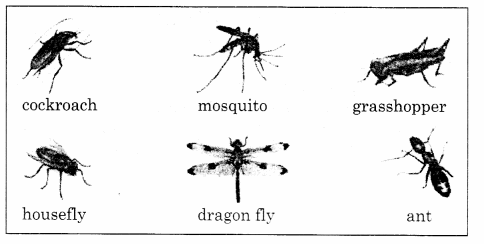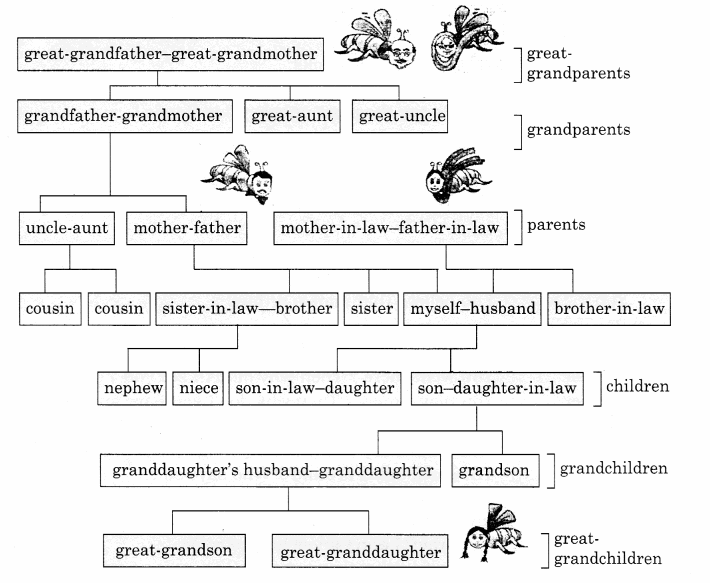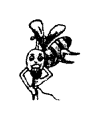NCERT Solutions for Class 7 Hindi Vasant Chapter 5 मिठाईवाला (भगवतीप्रसाद वाजपेयी) are part of NCERT Solutions for Class 7 Hindi. Here we have given NCERT Solutions for Class 7 Hindi Vasant Chapter 5 मिठाईवाला (भगवतीप्रसाद वाजपेयी)
| Board | CBSE |
| Textbook | NCERT |
| Class | Class 7 |
| Subject | Hindi Vasant |
| Chapter | Chapter 5 |
| Chapter Name | मिठाईवाला (भगवतीप्रसाद वाजपेयी) |
| Number of Questions Solved | 19 |
| Category | NCERT Solutions |
NCERT Solutions for Class 7 Hindi Vasant Chapter 5 मिठाईवाला (भगवतीप्रसाद वाजपेयी)
पाठ्यपुस्तक के प्रश्न-अभ्यास
(पृष्ठ 30-31)
कहानी से
प्रश्न 1.
मिठाईवाला अलग-अलग चीजें क्यों बेचता था और वह महीनों बाद क्यों आता था? [Imp.]
उत्तर
मिठाईवाले के बच्चों की असमय मृत्यु हो गई थी। वह अपने बच्चों की झलक इन गली के बच्चों में देखता था। जब बच्चे अपनी मधुर आवाज़ में उससे अलग-अलग चीजें माँगते तो ऐसे लगता जैसे वह अपने बच्चों की फरमाइशें पूरी कर रहा हो। वह कई महीनों बाद आता था क्योंकि उसे पैसों का कोई लालच न था। वह तो केवल अपने मन को संतुष्ट करने के लिए बच्चों की मनपसंद चीजें बेचा करता था। दूसरे बच्चों में अपने बच्चों की झलक पाकर संतोष, धैर्य तथा सुख का अनुभव करता था।
प्रश्न 2.
मिठाईवाले में वे कौन से गुण थे जिनकी वजह से बच्चे तो बच्चे, बड़े भी उसकी ओर खिंचे चले आते थे?
उत्तर-
मिठाईवाले में अनेक गुण थे, जिसके कारण बच्चे, बड़े और बूढ़े भी उनकी ओर खिंचे चले आते थे। उनमें विशेष प्रकार के कई गुण मौजूद थे, उनमें थे
(क) उसका स्वर बहुत मीठा था। वह गा-गाकर चीजें बेचता था।
(ख) उसका स्वभाव अत्यंत विनम्र था। वह मृदुभाषी तथा सहनशील था।
(ग) बच्चों के प्रति उसका व्यवहार अत्यंत मृदु, प्रेमपूर्वक एवं कोमल था।
(घ) वह सदैव फायदे के चक्कर में नहीं रहता था। पैसे नहीं होने पर भी वह खिलौने या अन्य वस्तुएँ मुफ्त में दे दिया। करता था।
(ङ) वह बच्चों की पसंद की नई-नई वस्तुएँ लाया करता था। उसके हृदय में बच्चों के लिए ममता थी।
प्रश्न 3.
विजय बाबू एक ग्राहक थे और मुरलीवाला एक विक्रेता। दोनों अपने-अपने पक्ष के समर्थन में क्या तर्क पेश करते हैं?
उत्तर
विजय बाबू एक ग्राहक थे और मुरलीवाला एक विक्रेता अर्थात् सामान बेचने वाला। विक्रेता ने स्वभावानुसार यह तर्क दिया कि सबको तो तीन रुपए की मुरली दी है लेकिन आपको दो रुपए की दे रहा हूँ क्योंकि हर दुकानदार ग्राहक को प्रसन्न करने हेतु ऐसा कहता है। दूसरी ओर विजय बाबू ने ग्राहक के स्वभावानुसार इस तर्क को काटा कि तुम लोग तो झूठ बोलते हो। तुमने सभी को ही इतने की दी होगी लेकिन मुझ पर ही अहसान जताना चाहते हो। वास्तव में किसी भी चीज के मोल-भाव करने के समय ऐसा संवाद क्रेता और विक्रेता के मध्य हो ही जाता है।
प्रश्न 4.
खिलौनेवाले के आने पर बच्चों की क्या प्रतिक्रिया होती थी?
उत्तर
खिलौनेवाले की मधुर आवाज सुनकर बच्चे चंचल हो उठते। उसके स्नेहपूर्ण कंठ से फूटती हुई आवाज़ सुनकर निकट के मकानों में हलचल मच जाती। छोटे-छोटे बच्चों को अपनी गोद में लिए स्त्रियाँ भी चिकों को उठाकर छज्जों पर से नीचे झाँकने लगतीं। गलियों तथा उनके भीतर स्थित छोटे-छोटे उद्यानों में खेलते और इठलाते हुए बच्चों का समूह उसे घेर लेता और तब वह खिलौनेवाला अपनी खिलौनों की पेटी वहीं खोल देता।
प्रश्न 5.
रोहिणी को मुरलीवाले के स्वर से खिलौनेवाले का स्मरण क्यों हो आया? [Imp.]
उत्तर
रोहिणी को मुरलीवाले के स्वर से खिलौनेवाले का स्मरण हो आया क्योंकि वह आवाज़ जानी-पहचानी थी। खिलौनेवाला भी इसी प्रकार मधुर कंठ से गाकर खिलौने बेचा करता था। मुरलीवाला भी ठीक वैसे ही मधुर आवाज़ में गा-गाकर मुरलियाँ बेच रहा था।
प्रश्न 6.
किसकी बात सुनकर मिठाईवाला भावुक हो गया था? उसने इन व्यवसायों को अपनाने का क्या कारण बताया?
उत्तर
दादी माँ की बात सुनकर मिठाईवाला भावुक हो गया था। उसने इन व्यवसायों को अपनाने का कारण यह बताया कि बच्चों को प्रसन्न देखकर मेरा हृदय प्रसन्न हो जाता है। इससे मुझे संतोष, धैर्य व असीम सुख की प्राप्ति होती है। इन बच्चों में मुझे अपने बच्चों की ही झलक नज़र आती है। ऐसा प्रतीत होता है कि इन्हीं बच्चों के रूप में ही उन्होंने जन्म लिया होगा।
प्रश्न 7.
अब इस बार ये पैसे न लँगा’-कहानी के अंत में मिठाईवाले ने ऐसा क्यों कहा? [Imp.]
उत्तर
दादी और रोहिणी से बातें करते हुए मिठाईवाला भावुक हो उठा उसने उन्हें बताया कि उसका भी घर-परिवार था, बाल-बच्चे व सुंदर पत्नी थी, वह स्वयं भी प्रतिष्ठित व्यक्ति था लेकिन अब उसके पास कुछ नहीं रहा। इसलिए अपने उन बच्चों की खोज में निकलता हूँ और इन्हीं बच्चों में मुझे उनकी झलक नज़र आती है तो संतुष्ट हो जाता हूँ। उसी समय रोहिणी के बच्चे चुन्नू-मुन्नू आकर मिठाई माँगने लगते हैं। वह दोनों को मिठाई से भरी एक-एक पुड़िया देता है। रोहिणी पैसे देती है तो उसका यह कहना–“अब इस बार ये पैसे न लँगा।” इस बात को दर्शाता है। कि उसका मन भर आया और वे बच्चे उसे अपने बच्चे ही लगे।
प्रश्न 8.
इस कहानी में रोहिणी चिक के पीछे से बात करती है। क्या आज भी औरतें चिक के पीछे से बात करती हैं? यदि करती हैं तो क्यों? आपकी राय में क्या यह सही है?
उत्तर-
आज प्रायः औरतें चिक के पीछे से बातें नहीं करती। हाँ, कुछ मुसलिम परिवारों, ग्रामीण क्षेत्रों, पिछड़े इलाके में औरतें परदे या चिक के पीछे आज भी बातें करती हैं। अपरिचित पुरुषों, गाँव-घर के बुजुर्गों से बातें करते समय ये परदा कर लेती हैं। ऐसे में वे चिक के पीछे से बात करने को मजबूर होती हैं। हमारी राय में यह पूर्णतया गलत है, क्योंकि स्त्री-पुरुष दोनों समाज के आधार हैं। दोनों को समान अधिकार मिलना चाहिए।
कहानी से आगे
प्रश्न 1.
मिठाईवाले के परिवार के साथ क्या हुआ होगा? सोचिए और इस आधार पर एक और कहानी बनाइए?
उत्तर-
मिठाईवाले का परिवार अवश्य ही किसी दुर्घटना का शिकार हुआ होगा। मिठाईवाले का परिवार कहीं जा रहा होगा और किसी दुर्घटना में उसकी पत्नी एवं बच्चे की मृत्यु हुई होगी। कहानी-एक गाँव में एक मिठाईवाले की दुकान थी। तरहतरह की वह भी मिठाइयाँ बेचा करता था। दुकान के साथ ही उसका घर था। लोग बड़े शौक से मिठाइयाँ खाते थे। दूर-दूर से लोग वहाँ आकर उसकी मिठाइयाँ खरीदा करते थे। उसके भी दो बच्चे थे। उसकी पत्नी सुंदर थी। एक हँसती-खेलता परिवार था। शहर में उसका मान था। आलिशान घर था। व्यवसाय फल-फूल रहा था। एक बार की बात है कि उसके नगर में महामारी फैली। इस शहर में इस महामारी के कारण अनेक लोगों की जान चली गई। मिठाईवाले ने भी अपने बच्चे एवं पत्नी को बचाने का काफ़ी प्रयास किया लेकिन नहीं बचा सका। मिठाईवाले की दुनिया उजड़ गई। वह दुख के सागर में डूब गया। अपने दुख से उबरने के लिए अपने घर को एक अनाथ आश्रम बना दिया। अनाथ बच्चों का वह पालन-पोषण किया करता था उसमें उसे असीम सुख मिलता था। उन बच्चों में उसे अपने बच्चे की झलक देखने को मिलती थी।
प्रश्न 2.
हाट-मेले, शादी आदि आयोजनों में कौन-कौन सी चीजें आपको सबसे ज्यादा आकर्षित करती हैं? उनको सजाने-बनाने में किसका हाथ होगा? उन चेहरों के बारे में लिखिए।
उत्तर
हाट-मेले, शादी आदि आयोजनों में हमें मिठाइयाँ, गोलगप्पें, चाट-पापड़ी, फूट-चाट, चीलें, छोले-भटूरे, सांभर-डोसा, इडली, चाइनिज फूड व इनके अलावा विभिन्न खाद्य पदार्थ आकर्षित करते हैं।
उनको बनाने-सजाने में विभिन्न पाक कला विशेषज्ञों का हाथ होता है। उन चेहरों के बारे में हम यही कह सकते हैं कि उनके चेहरे पर परिश्रम झलकता है और वे हर कार्य में निपुण दिखाई पड़ते हैं। जैसे-समोसे बनाने वाला समोसे बनाने में, सांभर-डोसा बनाने वाला सांभर-डोसा बनाने में, इडली बनाने वाला इडली बनाने में, आइसक्रीम बनाने वाला आइसक्रीम बनाने में आदि।
प्रश्न 3.
इस कहानी में मिठाईवाला दूसरों को प्यार और खुशी देकर अपना दुख कम करता है? इस मिजाज की और कहानियाँ, कविताएँ हूँढ़िए और पढ़िए।
उत्तर
पुस्तकालय की मदद से यह कार्य कीजिए।
अनुमान और कल्पना
प्रश्न 1.
आपकी गलियों में कई अजनबी फेरीवाले आते होंगे। आप उनके बारे में क्या-क्या जानते हैं? अगली बार जब आपकी गली में कोई फेरीवाला आए तो उससे बातचीत कर जानने की कोशिश कीजिए।
उत्तर
मैं दिल्ली में रहता हूँ। हमारी गली में मौसम के अनुसार कई फेरीवाले आते हैं। ऐसे ही सर्दियों में एक बार एक कश्मीरी शालें बेचने के लिए आया। माँ ने उसे बिठाया और शालें देखने लगी। मेरे मन में चाह हुई कि यह इतनी दूर से शालें बेचने क्यों आया है। मैंने उससे पूछ ही लिया कि ‘भैया’ तुम्हारी कोई दुकान नहीं है? वह बेचारा चुप हो गया और मुसकुराने लगा लेकिन मैंने जिज्ञासावश दोबारा पूछने की कोशिश की तो उसकी आँखों में आँसू आ गए। वह कहने लगा कि मेरा बहुत बड़ा शोरूम था, कई नौकर-चाकर थे लेकिन आतंकवादियों ने ऐसा हमला किया कि हमारे बाजार में बम विस्फोट हो गया। बड़ी मुश्किल से जान बचाई। सामान व दुकान जलकर खाक हो गईं। पेट पालना भी कठिन हो गया। मेरे भी छोटे-छोटे बच्चे, पत्नी व माता-पिता हैं। उनकी परवरिश करने का साधन न रहा इसीलिए जगह-जगह जाकर कश्मीरी शालें बेचता हूँ।
प्रश्न 2.
आपके माता-पिता के ज़माने से लेकर अब तक फेरी की आवाजों में कैसा बदलाव आया है? बड़ों से पूछकर लिखिए।
उत्तर
जब माता-पिता का जमाना था तो हर चीज़ फेरी वाले बेचने के लिए लाया करते थे। फेरी वालों की आवाजें मनभावन और कोई न कोई विशेषता लिए होती थी। जैसे कपड़े वाला आएगा तो डमडम या भोंपू, खिलौनेवाला ज़ोर-जोर से सीटियाँ, खाने की चीजों जैसे टिक्कीवाला अपने तवे पर ही भारी चीज़ से टनटन, ठंडे शरबत वाला लंबी-लंबी तान में आवाजें, झूले वाला धुंघरू बजाता था, लेकिन आज पहली बात तो यह है कि अधिक फेरी वाले आते ही नहीं क्योंकि लोग मोहर लगी चीजें अधिक पसंद करते हैं। दूसरा आते भी हैं तो अपने सामान से संबंधित आवाजें तो अवश्य लगाते हैं लेकिन उनमें विशेष आकर्षण कम हो गया है।
प्रश्न 3.
क्या आपको लगता है कि-वक्त के साथ फेरी के स्वर कम हुए हैं? कारण लिखिए।
उत्तर-
छात्र स्वयं करें।
भाषा की बात
प्रश्न 1.
मिठाईवाला बोलनेवाली गुडिया
• ऊपर वाला’ का प्रयोग है। अब बताइए कि-
(क) ‘वाला’ से पहले आनेवाले शब्द संज्ञा, सर्वनाम, विशेषण आदि में से क्या हैं?
(ख) ऊपर लिखे वाक्यांशों में उनका क्या प्रयोग है?
उत्तर
(क)‘वाला’ से पहले आने वाले शब्द संज्ञा और विशेषण के हैं-
(ख) मिठाईवाला में – मिठाई शब्द संज्ञा का है और वाला शब्द प्रकट करता है-मिठाई बेचने वाला।
बोलनेवाली गुड़िया में – बोलने वाली विशेषण शब्द है। जबकि गुड़िया शब्द संज्ञा है जो प्रकट करता है-वह गुड़िया जो बोलती है।
प्रश्न 2.
“अच्छा मुझे ज्यादा वक्त नहीं, जल्दी से दो ठो निकाल दो।”
- उपर्युक्त वाक्य में ‘ठो’ के प्रयोग की ओर ध्यान दीजिए। पूर्वी उत्तर प्रदेश और बिहार की भाषाओं में इस शब्द का प्रयोग संख्यावाची शब्द के साथ होता है, जैसे, भोजपुरी में-एक ठो लइका, चार ठो आलू, तीन ठो बटुली।
- ऐसे शब्दों का प्रयोग भारत की कई अन्य भाषाओं/बोलियों में भी होता है। कक्षा में पता कीजिए कि किस-किस की भाषा-बोली में ऐसा है। इस पर सामूहिक बातचीत कीजिए।
उत्तर-
- उपर्युक्त वाक्यों में ‘ठो’ के प्रयोग की ओर ध्यान देने पर पता चलता है कि पूर्वी उत्तर प्रदेश और बिहार की भाषाओं में इस शब्द का प्रयोग संख्यावाची शब्द के साथ होता है; जैसे-भोजपुरी में-दो ठो आम, चार ठो समोसा, एक ठो लड़का।
- चार नग टोपी।
प्रश्न 3.
“वे भी, जान पड़ता है, पार्क में खेलने निकल गए हैं।”
“क्यों भई, किस तरह देते हो मुरली?”
“दादी, चुन्नू-मुन्नू के लिए मिठाई लेनी है। जरा कमरे में चलकर ठहराओ।”
• भाषा के ये प्रयोग आजकल पढ़ने-सुनने में नहीं आते। आप ये बातें कैसे कहेंगे?
उत्तर
“लगता है, वे भी पार्क में खेलने चले गए हैं।”
“भैया, यह मुरली कितने की है?”
“दादी, चुन्नू-मुन्नू के लिए मिठाई लेनी है। ज़रा मिठाईवाले को कमरे में बुलवाओ।”
कुछ करने को
प्रश्न 1.
फेरीवालों की दिनचर्या कैसी होती होगी? उनका घर-परिवार कहाँ होगा? उनकी जिंदगी में किस प्रकार की समस्याएँ और उतार-चढ़ाव आते होंगे? यह जानने के लिए तीन-तीन के समूह में छात्र-छात्राएँ कुछ प्रश्न तैयार करें और फेरीवालों से बातचीत करें। प्रत्येक समूह अलग-अलग व्यवसाय से जुड़े फेरीवालों से बात करे।
उत्तर
फेरीवाले बेचारे सुबह से शाम तक गलियों के चक्कर लगाते होंगे। उनका घर-परिवार या तो उनसे अलग किसी गाँव या दूसरे शहर में होगा या किसी छोटी कॉलोनी में होगा। उनकी जिंदगी में अनेक समस्याएँ आती होंगी जैसे पूरा सामान न बिकना, बारिश हो जाने पर फेरी पर न जा पाना, अधिक गरमी में लोगों को घर से बाहर ही न निकलना, पैसे मिल जाएँ इसलिए कम दामों पर सामान बेचना। इस प्रकार की और भी कई समस्याओं का उन्हें सामना करना पड़ता होगा।
प्रश्नानुसार आज अलग-अलग व्यवसाय से जुड़े फेरीवालों से उनकी समस्याएँ व जीवन के बारे में बात करें।
प्रश्न 2.
इस कहानी को पढ़कर क्या आपको यह अनुभूति हुई कि दूसरों को प्यार और खुशी देने से अपने मन का दुख कम हो जाता है? समूह में बातचीत कीजिए।
उत्तर
कहानी मिठाईवाला पढ़कर इस बात की अनुभूति होती है कि दूसरों को प्यार और खुशी देने से अपने मन को दुख कम होता है जैसे मिठाईवाले के बच्चे और पत्नी एक हादसे में मर चुके थे। वह दूसरे बच्चों को जब उनकी पसंद का सामान ला-लाकर बेचता तो उनके चेहरे पर खुशी की लहर देखकर उसे संतोष, धैर्य और सुख का अनुभव होता। वह उन्हीं में ही अपने बच्चों की झलक देखने लगता।
प्रश्न 3.
अपनी कल्पना की मदद से मिठाईवाले का चित्र शब्दों के माध्यम से बनाइए।
उत्तर-
मिठाईवाला मीठा स्वर, लंबा दुबले पतले शरीर, भूरी-भूरी आँखें, सिर पर टोकरी, पैरों में चप्पल, पजामा, कुर्ता पहने, कंधे पर गमछा लिए चलता होगा। वह सिर पर पगड़ी बाँधता होगा। उसके कंधों पर फेरी का सामान होता होगा, जिसमें खट्टीमीठी, स्वादिष्ट, सुगंधित गोलियाँ होंगी। जब वह मीठी स्वर में आवाज़ लगाते हुए गली में आता होगा तो बच्चे दौड़कर उसे घेर लेते होंगे।
We hope the NCERT Solutions for Class 7 Hindi Vasant Chapter Vasant Chapter 5 मिठाईवाला (भगवतीप्रसाद वाजपेयी) help you. If you have any query regarding NCERT Solutions for Class 7 Hindi Vasant Chapter Vasant Chapter 5 मिठाईवाला (भगवतीप्रसाद वाजपेयी), drop a comment below and we will get back to you at the earliest.










